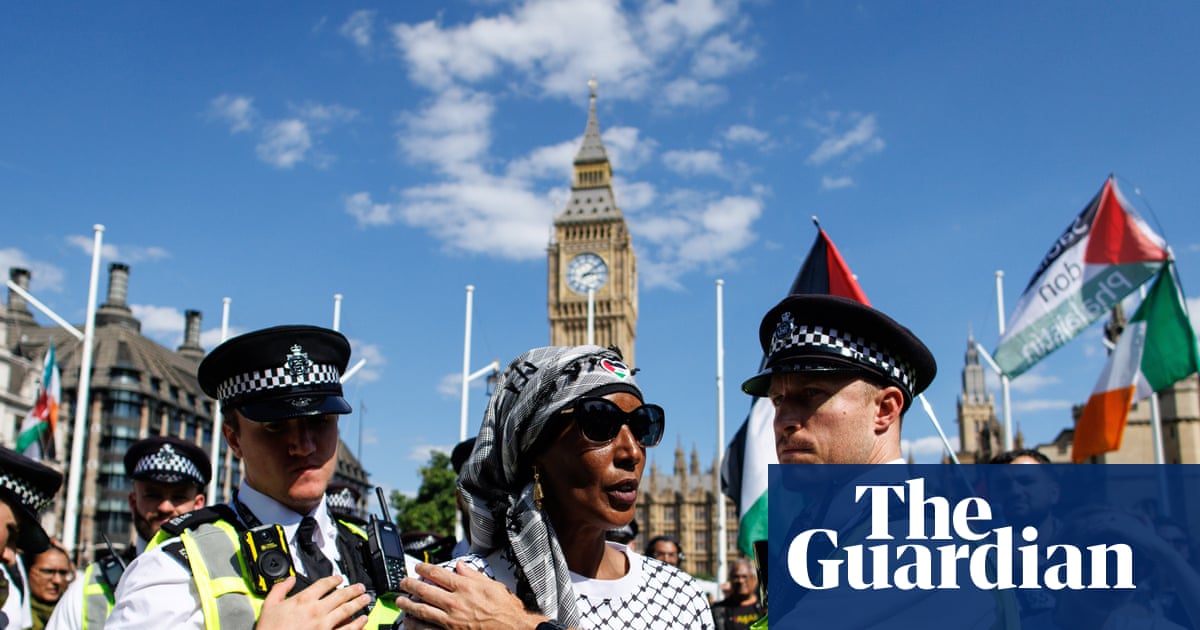Keir Starmer will order the home secretary to look at further curbs on protests including potential powers to take action against specific inflammatory chants at pro-Palestinian protests.
Speaking to reporters en route to Mumbai, the prime minister said Labour was looking at going even further than the measures announced by Shabana Mahmood, which would look at the “cumulative impact” of repeat protests in certain locations.
The proposals have been attacked by civil liberties group over the threats the potential restrictions pose to the right to protest. But after a terror attack on a Manchester synagogue, Starmer is also under pressure to go further, especially over chants that could invoke violence, such as “globalise the intifada”.
Over the weekend, Mahmood said the new laws would allow police officers to consider the cumulative impact of protest when deciding whether or not they are lawful. Protests could be re-routed or even barred altogether if their impact was considered too disruptive.
 ‘I’m 73 and never hurt a fly’: mass arrests at Palestine Action protest – video
‘I’m 73 and never hurt a fly’: mass arrests at Palestine Action protest – video
But Starmer said there was more that could be done, specifically to address the small minority of protesters on pro-Gaza marches who he suggested engaged in antisemitic hate.
“I’ve asked the home secretary to look more broadly at what other powers are available, how they’re being used and whether they should be changed in any way,” he said. “I think we need to go further than that in relation to some of the chants that are going on at some of these protests.”
Starmer also suggested that police forces could take further steps themselves. “That has to be part of the review that we carry into what powers do we have and how they’re being exercised. And then the question of do any of these powers therefore need to be changed or enhanced?
“And that’s the exercise we’re going through. But we are talking at length to leaders of the Jewish community about this, as you would expect.”
Starmer said the review would take in all of the government’s current powers over public order. “I think we need to review more broadly public order powers and there will be a series of actions that we will agree in due course across Whitehall,” he said.
Starmer and Mahmood had called on organisers not to go ahead with protests planned for the evening of the attack on the synagogue – or those to coincide with 7 October, the anniversary of the Hamas attack on Israel which killed more than 1,000 people.
Mahmood called the decision to go ahead with another pro-Palestine protest “fundamentally un-British” and “dishonourable”.
skip past newsletter promotion
Our morning email breaks down the key stories of the day, telling you what’s happening and why it matters
Privacy Notice: Newsletters may contain information about charities, online ads, and content funded by outside parties. If you do not have an account, we will create a guest account for you on theguardian.com to send you this newsletter. You can complete full registration at any time. For more information about how we use your data see our Privacy Policy. We use Google reCaptcha to protect our website and the Google Privacy Policy and Terms of Service apply.
after newsletter promotion
Tensions are already high with MPs over mass arrests of protesters supporting Palestine Action, in many cases for holding placards. The deputy prime minister, David Lammy, was booed while speaking at a vigil in Manchester in the aftermath of the attack by a suspected Islamist that left two Jewish worshippers dead.
In an article for the Times on Tuesday, marking the 7 October anniversary, Starmer said he wanted institutions to go further in rooting out antisemitism, including universities and the NHS. “We will continue to fund the security of Jewish schools and synagogues and take every possible step to stand up to this hatred wherever it is found,” he said.
The pressure group Defend Our Juries has promised to escalate the demonstrations in support of Palestine Action over 10 days in November. “The home secretary’s extraordinary new affront to our democracy will only fuel the growing backlash to the ban,” a spokesperson said. Almost 500 people were arrested in London for expressing support for the proscribed group.
Home Office sources have suggested that police would gain new powers to prevent protests if they take place at the same site on several occasions and cause repeated disorder. Organisers could be told to hold the event elsewhere, limit numbers and to set time limits.
The changes will be made by amending sections 12 and 14 of the Public Order Act of 1986, under which anyone breaching conditions set by police faces up to six months in jail, an unlimited fine, or both.
